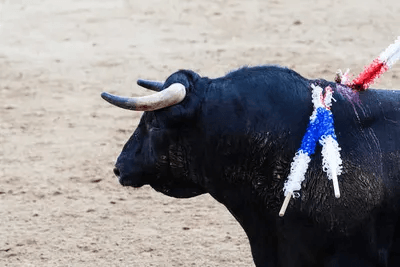KAKANJ (BOSNIA), May 13: While most girls her age split their time between school, chores and social life, 15-year-old Mirnesa Junuzovic spends her free hours in a far less typical way—training a 620-kg bull named Cobra for Bosnia’s age-old, yet peaceful, bullfighting competitions.
“I walk with Cobra for three or more hours every day,” she said, describing their rural treks through the forests and fields near her home on the outskirts of Kakanj.
“I talk to him, call him by different nicknames. I can always tell when he’s about to charge or scrape the ground.”
Junuzovic believes the bond she shares with Cobra goes beyond trainer and animal. “He moves tree branches with his horns to clear my path,” she added. “He’s just like a human—only he can’t talk.”
When others approach, Cobra turns wary. “His whole demeanor changes, he snorts and shifts,” she said. “But he never does that with me. He knows I care for him.”
Bosnia’s bullfighting culture, dating back over 200 years, isn’t the blood sport seen elsewhere. It’s a controlled, regulated spectacle resembling natural contests for dominance between male bulls.
Almost every weekend through the summer, makeshift arenas are set up in meadows and forest clearings where bulls face off in front of cheering crowds.
Unlike more violent counterparts in other countries, Bosnian bullfights are non-lethal, often lasting only a few minutes. Bulls push and lock horns until one backs down—no blood, no weapons, no fatalities.
Officials inspect horns, trim sharp tips, and check anti-doping test results to ensure humane conditions.
The events are deeply embedded in village traditions, often celebrated as multigenerational family outings.
“My grandpa loves it, he’s here today. I love it, my child loves it. We go to the fights together,” said Muriz Spahic, who drove over 70 kilometers to attend a recent bout in Bijelo Polje.
Between matches, the atmosphere resembles a folk festival: villagers grill meat, drink, dance, and blast local music.
Though traditionally the domain of men, bull training has begun to see rare participation from women, and Junuzovic—who began training at age 12—remains both the youngest and one of the few female trainers in the sport.
“Some classmates say it’s stinky,” she admitted with a grin, “but the people I care about support me. They always call when we win.”
And win she does. Cobra, considered a “lightweight” at 620 kilograms, extended his unbeaten streak to nine consecutive victories this season. His latest triumph came in Bijelo Polje when his opponent turned away without a serious attempt.
“The other bull just wasn’t ready,” Junuzovic said, smiling proudly. “Still, we won—and every victory counts.”
As thousands flock to these rustic arenas and old customs evolve, Mirnesa Junuzovic and Cobra stand as symbols of a new generation, keeping tradition alive while quietly reshaping it.

